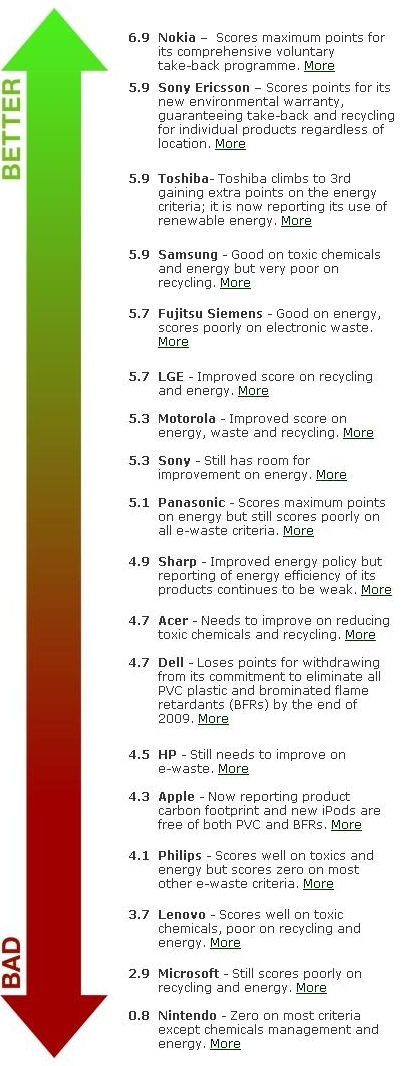Greenpeace: IT firms not tackling climate change

Greenpeace has taken a number of major technology companies to task over their environmental practices, saying they are not doing enough to combat climate change.
The environmental campaign organisation said in a statement on Monday that major companies, including Dell, Microsoft, Lenovo, LG, Samsung and Apple, are "failing to support the necessary levels of global cuts in emissions, and make the absolute cuts in their own emissions, that are required to tackle climate change".
"We want those companies to have global take-back systems, and focus clearly on energy reduction," Iza Kruszewska, a Greenpeace International toxics campaigner, told ZDNet UK on Monday. "The electronics sector should also be leading in, and calling for, strong emissions cuts."
In the 10th edition of its Guide to Greener Electronics, published on Monday, Greenpeace praised companies such as Nokia for their environmental practices.
Greenpeace ranked Nokia first among the electronics companies ranked, due to its "comprehensive" voluntary take-back programme, which provides almost 5,000 collection points for end-of-life mobile phones in 124 countries.
Nokia, which scored 6.9 points out of 10, was also praised for its reduction in the use of toxic materials in its products, including PVC and brominated flame retardants, used to reduce fire risk. However, Greenpeace said the company still had a "very poor" recycling rate of three to five percent.
Nintendo once again came bottom of the list, with a total mark of 0.8, scoring zero on all e-waste criteria.
Nintendo said that its use of materials and recycling policy comply with regulations.
"Nintendo takes great care to comply with all relevant regulations, including avoiding the use of dangerous materials and recycling of materials," said a Nintendo spokesperson. "All Nintendo products supplied worldwide are designed to comply with relevant global standards. Nintendo is always actively looking at ways to continue to increase its environmental stewardship and holds this as a corporate priority worldwide."
Microsoft fared better than Nintendo, scoring 2.9, but was criticised by Greenpeace for not implementing changes quickly.
"Microsoft is not moving fast enough," said Kruszewska. "Microsoft has improved by creating a sustainability team in the past year, but it seems it has only just woken up to green issues. It's not enough for companies to make commitments and then rest on their laurels."
Kruszewska added that companies such as Microsoft should see climate change as a business opportunity.
"The software business could improve the efficiency of services, and build more solutions for power, heat and water management," said Kruszewska.
Microsoft had not responded to a request for comment at the time of writing.
In the previous Guide to Greener Electronics, released in September, Greenpeace welcomed moves by Apple to make greener MacBooks, but said that more needed to be done to reduce greenhouse-gas emissions.
